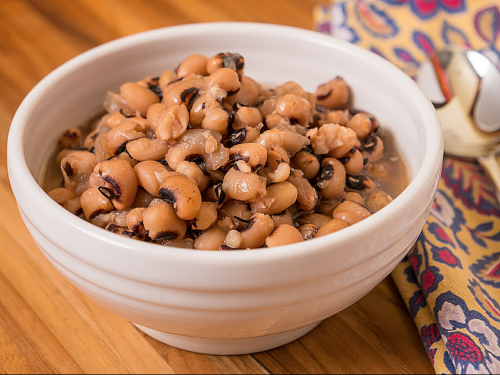New Year’s is practically here, and folks all around the globe have superstitious food traditions they indulge in that have significance for them. Some of these food rituals ensure good luck in the year ahead, and for African Americans, nothing signifies prosperity like down-home black-eyed peas.
The tradition of eating black-eyed peas to kick off the New Year got its roots in West Africa. The legumes were a diet staple for many throughout the continent. Black-eyed peas were a product of the slave trade that made their way to these shores in the holds of slave ships as food for those Africans, who were dragged here against their wills. Today the beans are enjoyed practically everywhere around the world.
The New Year’s signature dish, typically accompanied by white rice, collard greens, and seasoned smoked pork, forms a culinary trinity—beans, greens, and pig. The greens symbolize greenbacks (paper money), the pork stands for progress because the animal pushes forward, and the black-eyed peas are reminiscent of coins or pocket change.
Black-eyed peas can benefit you healthwise too, which makes them lucky. Nutritionally, the beans are chock-full of dietary fiber that promotes digestive regularity. Eating black-eyed peas can also help prevent constipation. If you’re fretting about consuming too many beans and passing gas, well, don’t! A study conducted by Arizona University School of Nutrition and Health Promotion, and the University of Colorado examined the connection between eating beans and passing gas. The clinicians ultimately concluded that concerns with regards to the consumption of beans and flatulence are highly exaggerated.
Black-eyed peas are high in iron, folate, and B Vitamin which helps to make normal red blood cells. Since hypertension has long been a scourge in the Black community, eating potassium-rich black-eyed peas helps keep blood pressure levels at a healthy rate and lowers the risk of heart disease. Vitamin E is present in black-eyed peas, which is linked to controlling blood sugar and reducing the risk of type 2 diabetes. Black-eyed peas contain a potent dose of Vitamin A, which helps maintain good eyesight, particularly in low light. Lastly, black-eyed peas contain antioxidants like Vitamin A, Vitamin C, and Vitamin E; these vitamins play an essential role in preventing certain types of cancer.
Nothing says “Happy New Year” like a good ole pot of black-eyed peas. If you don’t want to add pork into the mix, try smoked turkey for a dash of flavor. Here is a surefire recipe for Crock-Pot, kicked-up-a-notch, black-eyed peas that will make folks say, ‘you put your foot in it!’
Ingredients:
1 pound of dried black-eyed peas (rinsed)
1 large onion (chopped)
1 large smoked ham hock
4 strips of bacon (diced and cooked)
½ teaspoon of cayenne pepper (more or less if you desire)
1 teaspoon of garlic powder
add salt to taste
½ teaspoon of black pepper
Go for it:
- In a large pot, cover beans with water to about 3-inches over the peas. Bring to a boil, turn down the heat, simmer for about an hour or so, until beans are tender.
- Place the ham hock, chopped onion, bacon, cayenne pepper, garlic powder, salt and black pepper in a slow cooker. Add three cups of water. Cover and cook on HIGH for about an hour.
- When beans are tender, drain the pot then add them to the slow cooker. Reduce the slow cooker’s heat to LOW, cover and cook for about 5 to 7 hours.
- Remove the hock from the pot. Strip the meat from the hock, shred it, then add it back to the peas.
- Add more salt or pepper to taste
*Serve black-eyed peas over white rice with some fresh cornbread. Have mercy ya’ll!
